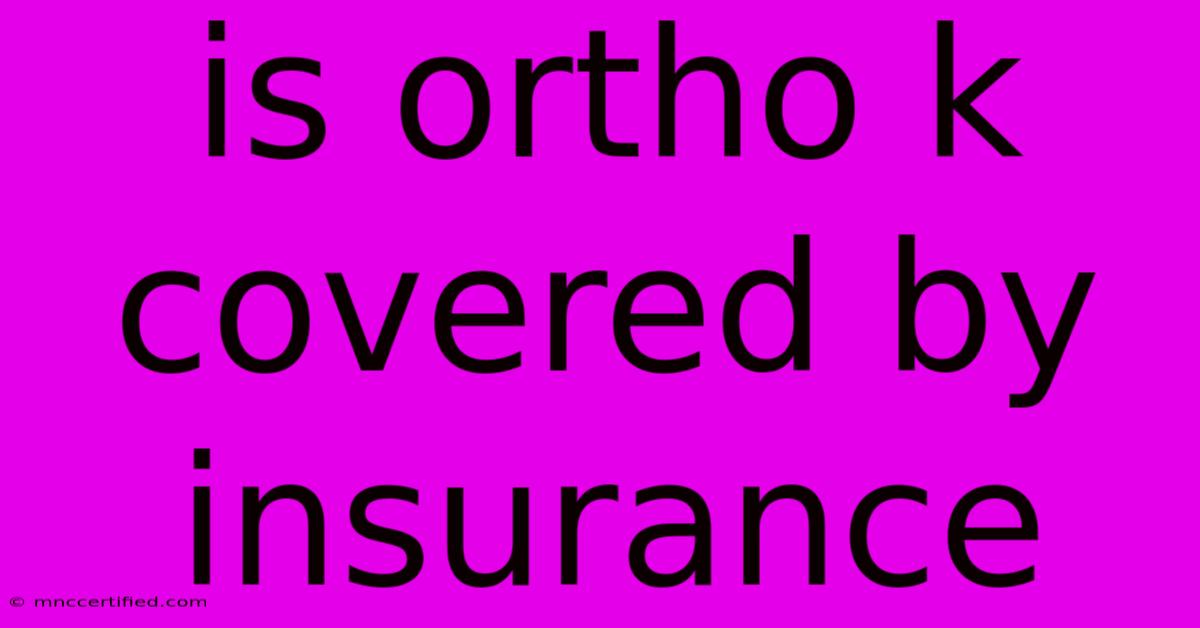Is Ortho K Covered By Insurance

Table of Contents
Is Ortho-k Covered by Insurance? A Comprehensive Guide
Are you considering Ortho-k (Orthokeratology) as a vision correction method? A crucial factor in your decision-making process will likely be insurance coverage. The simple answer to "Is Ortho-k covered by insurance?" is: it depends. This comprehensive guide will delve into the nuances of Ortho-k insurance coverage, helping you navigate the complexities and understand what to expect.
Understanding Ortho-k and Insurance Coverage
Ortho-k involves wearing specially designed rigid gas permeable (RGP) contact lenses overnight to reshape the cornea, providing clear vision during the day without the need for glasses or daytime contact lenses. Because it's a relatively specialized treatment, insurance coverage varies significantly.
Factors Influencing Ortho-k Insurance Coverage
Several factors determine whether your insurance plan will cover Ortho-k:
-
Type of Insurance Plan: Traditional health insurance plans (like those offered through employers) are more likely to cover medically necessary procedures. Vision plans, often separate from health insurance, may or may not cover Ortho-k. Check your specific policy details. Always review your policy's fine print. This is critical.
-
Policy's Specific Coverage: Even within the same type of insurance, coverage for Ortho-k can differ dramatically. Some policies may cover it as a medically necessary treatment if you have certain eye conditions, while others might only cover routine eye exams.
-
Medical Necessity: This is a key consideration. Insurance companies often require a demonstration of medical necessity to approve Ortho-k coverage. This usually involves a referral from an ophthalmologist or optometrist who can explain why Ortho-k is the most appropriate treatment for your specific condition. Conditions like keratoconus or high myopia might increase the chances of coverage.
-
Pre-authorization: Many insurance companies require pre-authorization before Ortho-k treatment begins. This involves submitting a request for coverage before your appointments to ensure it’s approved and covered, saving you potential out-of-pocket expenses. Don't skip this step!
-
Provider Network: Ensuring your eye care professional is in your insurance company's network is essential. Out-of-network providers often lead to higher out-of-pocket costs.
What to Do Before Seeking Ortho-k Treatment
-
Contact your insurance provider: This is the most important step. Call your insurance company directly and specifically ask about coverage for Ortho-k, including any pre-authorization requirements. Ask for a written confirmation of coverage details.
-
Consult with your eye doctor: Discuss your vision needs and Ortho-k suitability. They can help you understand if Ortho-k is medically necessary for your condition and assist you with the pre-authorization process with your insurer.
-
Gather necessary documentation: Your eye doctor can provide documentation to support the medical necessity of Ortho-k treatment for your insurance claim.
Maximizing Your Chances of Ortho-k Insurance Coverage
- Provide comprehensive documentation: Thoroughly document your medical history and eye condition. Clear medical justification will significantly strengthen your claim.
- Explore different insurance plans: If you're not satisfied with your current insurance coverage, consider exploring other plans that offer more comprehensive vision benefits.
- Appeal denied claims: If your claim is initially denied, don’t give up! File an appeal with your insurance company, providing additional supporting documentation.
Alternatives if Ortho-k Isn't Covered
If your insurance doesn't cover Ortho-k, consider these alternatives:
- Traditional contact lenses: These are generally less expensive and more readily covered by insurance.
- LASIK surgery: While potentially more expensive upfront, LASIK might be a more long-term cost-effective option depending on your individual circumstances and insurance coverage.
- Eyeglasses: This remains a reliable, affordable, and widely accepted vision correction method.
Conclusion
Determining Ortho-k insurance coverage requires proactive investigation and clear communication with your insurance provider and eye care professional. By understanding the factors influencing coverage and following the steps outlined above, you can increase your chances of securing coverage for this advanced vision correction technique. Remember to always verify your coverage details directly with your insurance provider. Don't hesitate to ask questions; your vision health is paramount.

Thank you for visiting our website wich cover about Is Ortho K Covered By Insurance. We hope the information provided has been useful to you. Feel free to contact us if you have any questions or need further assistance. See you next time and dont miss to bookmark.
Featured Posts
-
Bayern Rout Augsburg 3 0 Match Review
Nov 23, 2024
-
Can A Bondsman Revoke Your Bond
Nov 23, 2024
-
How Much Are 100 Bitcoins Worth
Nov 23, 2024
-
Performance And Points Clements Aim
Nov 23, 2024
-
Upside Down Cross Chain Diamond
Nov 23, 2024